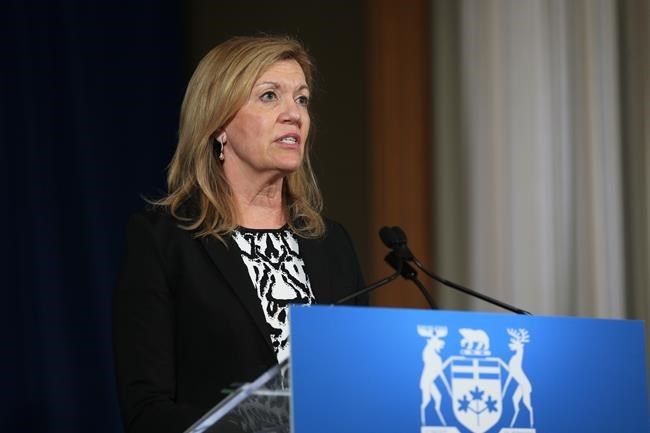
Health Minister Christine Elliott speaks at the daily press briefing at Queens Park in Toronto on Tuesday, June 2, 2020. THE CANADIAN PRESS/Rene Johnston - POOL
Republished June 02, 2020 - 5:28 PM
Original Publication Date June 02, 2020 - 12:26 PM
TORONTO - The importance of understanding the role race might play in the COVID-19 pandemic has prompted Ontario to look at regulatory changes to make collection of such data provincewide, the government said Tuesday.
The province had granted some health units permission to begin collecting race-based data voluntarily and some have begun doing so, but critics argue it's not enough.
A spokeswoman for Health Minister Christine Elliott said the province was working with public health and privacy experts to collect such data but noted it would require changing regulations.
"We recognize that the collection of race-based data is important in order to guide our decision-making on how to protect vulnerable groups who may be at a higher risk for COVID-19," Hayley Chazan said. "The ministry is considering proposing to make income level and race for COVID-19 cases reportable to local public health units."
Some units, including Ottawa, Toronto, Middlesex-London and Sudbury, have already been collecting such data, Chazan said.
In the U.S., public health officials discovered in April that the potentially lethal SARS-CoV-2 virus was disproportionately affecting black communities. Advocates say the data are important for decision-making at the provincial and local levels in order to help contain the spread more effectively and to help those hit hardest.
In early May and again this week, the federal government agreed such information was sorely lacking. What is already known — if not with scientific precision as to exactly why — is that the pandemic has disproportionately affected parts of cities such as Montreal and Toronto.
Efforts were underway at closing the data gap, Canada's top public health officer Dr. Theresa Tam said Monday.
OmiSoore Dryden, an associate professor and chairwoman of Black Canadian Studies at Dalhousie University, said the information is needed to properly identify health disparities. Analysis of such data, she said, should be done by anti-racism experts — those health researchers, epidemiologies and statisticians who have also been trained in critical race theory and decolonization.
"Claiming to adopt a colour-blind approach has resulted in increased health inequities with, and poorer health outcomes for, black and Indigenous people," Dryden said.
Manitoba is currently the only province in Canada to collect such data.
The task has instead largely fallen on local health agencies, which have been swamped with gathering even basic data such as age and gender on the spread of COVID-19 and its impact. The Association of Local Public Health Agencies, which represents health units in Ontario, said medical authorities were facing multiple demands related to the novel coronavirus.
"Public health units have different capacities and population densities that impact their abilities to collect, analyze and report on race-based data," said the association's executive director, Loretta Ryan, on Tuesday. "Their challenges in doing so should not be seen as a lack of interest with regards to this matter."
Toronto Public Health has been analyzing cases of coronavirus disease in terms of geographic area. The information has indicated higher infection rates were more prevalent in low-income neighbourhoods with a higher percentage of immigrants and visible minorities.
Dr. Vinita Dubey, Toronto's associate medical health officer, said questions on Indigenous identity, race, income and household size were recently added to the city's COVID information system known as CORES.
"This means it will be several more weeks before we have collected enough data through CORES to report any findings," Dubey said. "In the meantime, we are using information about the areas where people live based on federal census data to estimate associations between COVID-19 and socio-demographic characteristics."
In an open letter to Elliott and Chief Medical Officer of Health Dr. David Williams on Tuesday, Toronto city council and its board of health urged them to mandate provincial race-based data. The information, as well as details on occupation and other socioeconomic indicators, should be collected in a manner that does not identify individuals, they said.
"In order to tackle COVID-19 we must fully understand it, and who is most at risk," Coun. Joe Cressy, who chairs the board of health, said in the letter. "To protect our residents and beat COVID-19, we need the Ontario government to collect and share disaggregated data."
This article by The Canadian Press was first published June 2, 2020.
Note to readers: This is a correct story. A previous version had an incorrect name for Ontario Chief Medical Officer of Health Dr. David Williams.
News from © The Canadian Press, 2020